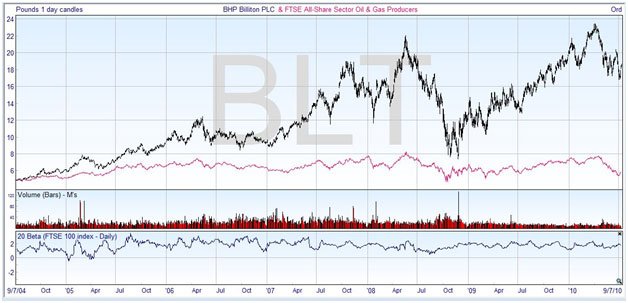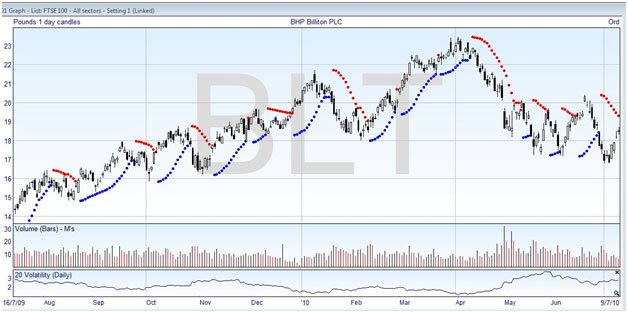London-listed mining and resource business BHP Billiton is a worldwide natural resources company operating in Australia, Africa and the Americas. Originally founded in 1885, when it was called the Broken Hill Proprietary Company (BHP), it was as recent as 2001 when Australian Broken Hill Proprietary Company Limited (BHP) merged with Anglo–Dutch Billiton plc to make BHP Billiton, the largest mining company in the world. Billiton was an even older mining company, started in 1860 in the Netherlands.
BHP Billiton is still very diversified, despite spinning off the steel production side in 2000. The miner not only has top-notch assets but also benefits from low operating and geopolitical risk and a strong balance sheet. It has fingers in the energy sector, with oil and gas exploration and coal mining; mines various base metals such as lead, zinc, copper, and bauxite from which it makes aluminium; and also produces diamonds, titanium, silver, and uranium. It is interesting to note that petroleum makes about a quarter of the company’s earnings
Investors looking for exposure to the commodities sector should look at BHP Billiton, due to its size and diversity. The key factors to determine the firm’s share price performance in 2014 will be commodity prices, demand for those commodities, and ultimately, the health of the Chinese and global economy. BHP, like many other basic resources companies, suffered in 2012/2013 as a result of the weakening economic environment, with the level of Chinese GDP growth slowing to about 7%.
In recent years the company has, and continues to, rationalise its portfolio by making a number of significant disposals to streamline the business and it has invested in large, capital intensive projects to expand capacity. This makes the company well positioned to meet any potential increase in demand.
With such a wide base, you might expect it to have a relatively stable share price. However, perhaps because of the nature of the industry, its beta (a measure of the price stability relative to the market as a whole, as measured by the FTSE 100 index) runs about 1.5 to 2.0, and has been as high as 3.0 in recent years — the market’s beta by definition is 1.0. This means you would expect BHP Billington’s shares to increase and decrease in price faster than the index.
 |
You can see that the beta value rarely goes below 1.0. This makes BHP Billiton a good candidate for spread betting, as you can expect bigger swings than the general market.
Coupled with this, you can see that the stock has been trading in clearly defined trends. The rise from the beginning of 2007 to May 2008 is a classic example of an Elliott Wave, with three clear advances to new peaks and two retracements, then two declining waves and a rising retracement in September 2008 on the downtrend.
 |
Welles Wilder’s Parabolic Stop and Reverse, shown on this chart, defines more clearly the surges and retracements that this stock has been demonstrating, and as you can see it has a very regular form that allows it to be anticipated and traded. The SAR is usually used to set a trailing stop, but it is also a good indicator of the pulse of the price, providing as it does the clear break between uptrend and downtrend moves (albeit a little lagging) and the sharp graphical distinction of two colours.
Having said that, you will see at the right hand edge that the stock has turned sideways and is ranging. On this scale, it is showing signs of a broadening formation, or megaphone top, and this usually signals a chaotic time in the market, which can be hazardous to your wealth. Look for a breakout from the broadening triangle, which is often to the downside. You can trade the wild swings of price if you have a spirit of adventure, and there are profits to be made, but you must be on the lookout for rapid reversals. If you can stay on top of it, this is the type of pattern that can result in large profits from spread betting because of the violent movements.
How to Spread Bet on BHP Billiton shares?
Presently (note: prices quoted at August 2010), the BHP Billiton (September) market is trading at 2003.7 – 2007.1 with Capital Spreads for instance.
With the BHP Billiton (September) market, which closes on 2010/09/14, you can place a spread bet on:
BHP Billiton to finish higher than 2007.1 on the closing date, or
BHP Billiton to finish lower than 2003.7 on the closing date
Do keep in mind that when spread betting UK shares, you trade in ‘Pounds per penny’ where a penny is represented by a 1p of BHP movement. For instance, if you go long betting £10 per penny and BHP Billiton goes up 40p, then this would translate to a £400 profit.
